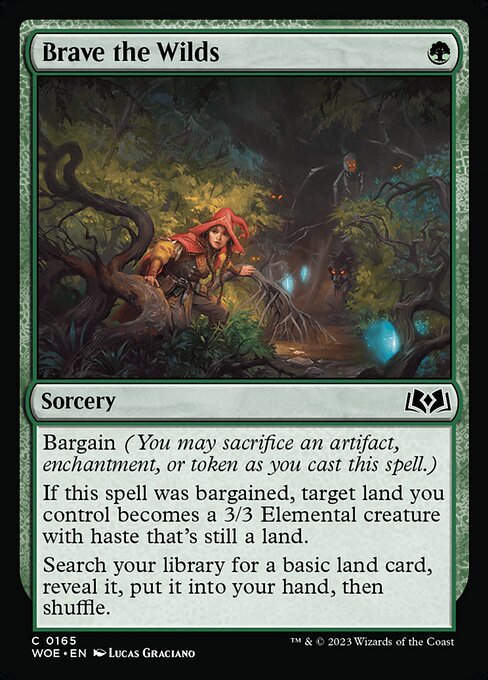Brave the Wilds
Sorcery
Bargain (You may sacrifice an artifact, enchantment, or token as you cast this spell.)
If this spell was bargained, target land you control becomes a 3/3 Elemental creature with haste that's still a land.
Search your library for a basic land card, reveal it, put it into your hand, then shuffle.
If this spell was bargained, target land you control becomes a 3/3 Elemental creature with haste that's still a land.
Search your library for a basic land card, reveal it, put it into your hand, then shuffle.
standard
future
historic
gladiator
pioneer
explorer
modern
legacy
pauper
vintage
penny
commander
brawl
alchemy
paupercommander
duel
oldschool
premodern
Rulings
You may sacrifice only one artifact, enchantment, or token to pay a spell’s bargain cost.
Some instant and sorcery spells require additional targets if they’re bargained. You ignore those targeting requirements if those spells aren’t bargained, and you can’t bargain those spells unless you can choose the appropriate targets. On the other hand, you can bargain a permanent spell even if you won’t be able to choose targets for an enters-the-battlefield ability of that permanent once the spell resolves.
If you copy a bargained spell, the copy is also bargained. If a card or token enters the battlefield as a copy of a permanent that’s already on the battlefield, the new permanent isn’t bargained, even if the original was.
Bargain represents an optional additional cost. A spell cast with that additional cost paid is “bargained.”
If you bargained Brave the Wilds and the target land is an illegal target by the time it tries to resolve, the spell won't resolve. You won't search for a basic land card, and you won't shuffle.
Bargain means “As an additional cost to cast this spell, you may sacrifice an artifact, enchantment, or token.”
Some instant and sorcery spells require additional targets if they’re bargained. You ignore those targeting requirements if those spells aren’t bargained, and you can’t bargain those spells unless you can choose the appropriate targets. On the other hand, you can bargain a permanent spell even if you won’t be able to choose targets for an enters-the-battlefield ability of that permanent once the spell resolves.
If you copy a bargained spell, the copy is also bargained. If a card or token enters the battlefield as a copy of a permanent that’s already on the battlefield, the new permanent isn’t bargained, even if the original was.
Bargain represents an optional additional cost. A spell cast with that additional cost paid is “bargained.”
If you bargained Brave the Wilds and the target land is an illegal target by the time it tries to resolve, the spell won't resolve. You won't search for a basic land card, and you won't shuffle.
Bargain means “As an additional cost to cast this spell, you may sacrifice an artifact, enchantment, or token.”
Rulings
You may sacrifice only one artifact, enchantment, or token to pay a spell’s bargain cost.
Some instant and sorcery spells require additional targets if they’re bargained. You ignore those targeting requirements if those spells aren’t bargained, and you can’t bargain those spells unless you can choose the appropriate targets. On the other hand, you can bargain a permanent spell even if you won’t be able to choose targets for an enters-the-battlefield ability of that permanent once the spell resolves.
If you copy a bargained spell, the copy is also bargained. If a card or token enters the battlefield as a copy of a permanent that’s already on the battlefield, the new permanent isn’t bargained, even if the original was.
Bargain represents an optional additional cost. A spell cast with that additional cost paid is “bargained.”
If you bargained Brave the Wilds and the target land is an illegal target by the time it tries to resolve, the spell won't resolve. You won't search for a basic land card, and you won't shuffle.
Bargain means “As an additional cost to cast this spell, you may sacrifice an artifact, enchantment, or token.”
Some instant and sorcery spells require additional targets if they’re bargained. You ignore those targeting requirements if those spells aren’t bargained, and you can’t bargain those spells unless you can choose the appropriate targets. On the other hand, you can bargain a permanent spell even if you won’t be able to choose targets for an enters-the-battlefield ability of that permanent once the spell resolves.
If you copy a bargained spell, the copy is also bargained. If a card or token enters the battlefield as a copy of a permanent that’s already on the battlefield, the new permanent isn’t bargained, even if the original was.
Bargain represents an optional additional cost. A spell cast with that additional cost paid is “bargained.”
If you bargained Brave the Wilds and the target land is an illegal target by the time it tries to resolve, the spell won't resolve. You won't search for a basic land card, and you won't shuffle.
Bargain means “As an additional cost to cast this spell, you may sacrifice an artifact, enchantment, or token.”
Your collection? Your decks?
Want to manage your collection and/or create decks?


 0
0
 0.07€
0.07€